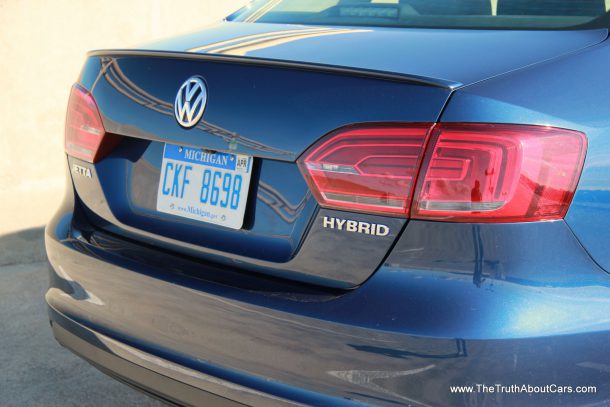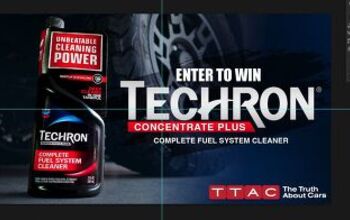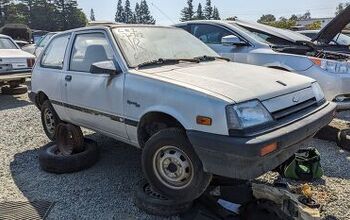Auf Wiedersehen: Volkswagen Quietly Kills Sole Hybrid Model

If you’ve long since erased the Volkswagen Jetta Hybrid from your memory bank, don’t worry. Buyers forgot about it at the same time, and the automaker is prepared to do the same.
When Volkswagen rolled out a list of changes to its 2017 year vehicles today, the Jetta Hybrid was nowhere to be seen. Instead, the automaker placed a note in its empty chair, reading “Jetta Hybrid no longer available.”
It was an undignified (but not unexpected) end for a very unpopular model — one the automaker doesn’t need weighing it down as it tries to streamline its operations in a bid to save cash.
As the automaker’s sole hybrid offering in the United States, the Jetta Hybrid made more sense as green window dressing than it did as a marketable vehicle. Buyers agreed. Entry-level Jettas started pretty cheap for a German car, and the now-maligned (and recalled, and soon-to-be crushed) TDI models offered better power and great mileage for less money. Even now, a Jetta equipped with the fuel-sipping 1.4-liter gas engine is an attractive and economical choice.
Would you buy an unremarkable hybrid version of an existing compact for $31,940 in 2016?
Sales of the model tanked right from the start. In 2013, the Hybrid recorded 5,655 sales, followed by 1,939 in 2014 and 740 in 2015. As of the end of May, Volkswagen only sold 227 Jetta Hybrids this year. The public let their absence do the talking, and Volkswagen listened. (VW isn’t the only automaker struggling with low demand for hybrids.)
With diesel models sidelined and the hybrid gone, Volkswagen’s lineup is now all gas, with the exception of the EV version of the Golf. The company insists that will change. In its long-term plan, which maps out the company’s actions over the next decade, the automaker said it would roll out over 30 battery electric models between now and 2025, but possibly at the expense of 40 other models.

More by Steph Willems
Latest Car Reviews
Read moreLatest Product Reviews
Read moreRecent Comments
- Hari Your route home sounds like the perfect stretch for a car like the Alfa Romeo Giulia. Its renowned handling and dynamic performance make it an ideal match for those curves. For enthusiasts or potential owners interested in understanding all the capabilities of the Giulia 2017, the owner’s manual is an invaluable resource. Check it out here: https://chatwithmanuals.com/automobiles/2017-alfa-romeo-giulia-owners-manual/. Our AI-powered chat makes navigating the manual simple, helping you quickly find specific details about the car's features and specs. Perfect for making the most out of those driving moments and truly understanding your vehicle!
- Dale I'd consider the RAV4 if the Prime were on the table as paying for gas is for suckers. Otherwise, we have a couple of Mazdas and they are swell. I've driven older versions of both and the CX-5 is a nicer place to live.
- Haran Spot-on review of the Mercedes-AMG GT’s price adjustments and new features! For those intrigued by the all-wheel drive and enhanced features of the latest model, you can delve deeper with the complete operator's manual available here: https://chatwithmanuals.com/automobiles/mercedes-amg-gt-operators-manual-edition-c2020/. It’s a fantastic resource for understanding all the specs and new additions without getting bogged down by the complexity typically associated with car manuals. Chat with the manual using AI to quickly find exactly what you need to know about this sporty beast. Perfect for those who appreciate detailed insights on their luxury investments!
- Flashindapan Beautiful color combinations. I assumed they stop selling the TT here at least five or six years ago.
- Carson D Just don't be the whistleblower who reports on the falsification of safety data. That's a deadly profession.


































Comments
Join the conversation
My 2016 Jetta 1.4t which I purchased for $17,000 (VW was hurting in March) new returns 40+ mpg and 184 ft-lbs of torque - why would I fuck with a hybrid or diesel for thousands upon thousands more dollars?
I actually saw a Jetta Hybrid on the road the other day. Startling to see the hybrid logo on the trunk of a VW. No doubt stopping production of this sales flop makes sense for a maker who needs to reduce inventory and production costs. It also makes sense in the context of Germany's decision to limit sales of new cars to electric-only as of 2030. Was THAT reported on TTAC? Norway and Holland have banned new non-hybrids and ev's as of 2025. The writing is on the wall for ICE cars. Why develop and sell hybrids (and diesels) when you're going to need the resources to develop pure ev's.